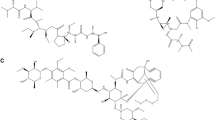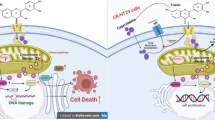Abstract
The treatment of colorectal cancer (CRC) is important from a clinical prospective. Bee venom (BV) has shown anti-mutagenic, radio-protective, anti-inflammatory, and anti-tumor activities. Thus, this study was designed to evaluate the anti-tumor effects of BV on colorectal cancer-derived HT-29 cells. MTT assay and flow cytometry analyses were carried out to evaluate the effect of the BV on the cell viability and the induction of apoptosis, respectively. The intracellular levels of reactive oxygen species (ROS) was measured using a ROS assay kit. The mRNA expression of cyclooxygenase − 2 (Cox-2), tumor necrosis factor-alpha (TNF-α), and interleukin 1 beta (IL-1β) was evaluated using qRT-PCR. The IC50 value of BV for HT-29 cells at 24 h was 80 µg/mL. Unlike HT-29 cells, BV had no toxic impact on NIH/3T3 normal fibroblast cells. Bee venom also induced accumulation of cells in the Sub-G1 phase of the cell cycle and induced HT-29 cell apoptosis and necrosis. In addition, we found that BV could significantly prevent the production of ROS and thereby reduce the expression of pro-inflammatory cytokines in HT-29 cells (p < 0.05). This study suggests that BV might be a promising candidate to be developed as a natural agent against CRC.
Graphical Abstract





Similar content being viewed by others
Abbreviations
- CRC :
-
Colorectal cancer.
- BV :
-
Bee venom.
- ROS :
-
Reactive Oxygen Species.
- TNF-α :
-
Tumor necrosis factor-alpha.
- IL-1β :
-
Interleukin 1 beta.
- NSAID :
-
Non-steroidal anti-inflammatory drugs.
- Cox-2 :
-
Cyclooxygenase-2.
- NAC :
-
N-acetyl cysteine.
- PI :
-
Propidium iodide.
- ASA :
-
Acetylsalicylic acid.
References
Amini E, Baharara J, Nikdel N, Salek Abdollahi F (2015) Cytotoxic and Pro-Apoptotic Effects of Honey Bee Venom and Chrysin on Human Ovarian Cancer Cells. Asia Pac J Med Toxicol 4:68–73. https://doi.org/10.22038/APJMT.2015.5084
Aran V, Victorino AP, Thuler LC, Ferreira CG (2016) Colorectal Cancer: Epidemiology, Disease Mechanisms and Interventions to Reduce Onset and Mortality. Clin Colorectal Cancer 15:195–203. https://doi.org/10.1016/j.clcc.2016.02.008
Carpena M, Nuñez-Estevez B, Soria-Lopez A, Simal-Gandara JJN (2020) Bee Venom: An Updating Review of Its Bioactive Molecules and Its Health Applications. Nutrients 12:3360. https://doi.org/10.3390/nu12113360
Chen CC, Sun YT, Chen JJ, Chiu KT (2000) TNF-alpha-induced cyclooxygenase-2 expression in human lung epithelial cells: involvement of the phospholipase C-gamma 2, protein kinase C-alpha, tyrosine kinase, NF-kappa B-inducing kinase, and I-kappa B kinase 1/2 pathway. J Immunol (Baltimore, Md.: 1950), 165: 2719–2728.https://doi.org/10.4049/jimmunol.165.5.2719
Danese S, Mantovani A (2010) Inflammatory bowel disease and intestinal cancer: a paradigm of the Yin–Yang interplay between inflammation and cancer. Oncogene 29:3313–3323. https://doi.org/10.1038/onc.2010.109
Ebrahimi S, Mirzavi F, Aghaee-Bakhtiari SH, Hashemy SI (2022) SP/NK1R system regulates carcinogenesis in prostate cancer: Shedding light on the antitumoral function of aprepitant. Biochim Biophys Acta Mol Cell Res BBA-MOL CELL RES 1869:119221. https://doi.org/10.1016/j.bbamcr.2022.119221
Hanif R, Pittas A, Feng Y, Koutsos MI, Qiao L, Staiano-Coico L, Shiff SI, Rigas B (1996) Effects of nonsteroidal anti-inflammatory drugs on proliferation and on induction of apoptosis in colon cancer cells by a prostaglandin-independent pathway. Biochem Pharmacol 52:237–245. https://doi.org/10.1016/0006-2952(96)00181-5
HimaVyshnavi A, Lakshmi AC, Deepak O, Namboori PK (2017) Evaluation of colorectal cancer (CRC) epidemiology a pharmacogenomic approach. J Young Pharm 9:36–39. https://doi.org/10.5530/jyp.2017.9.7
Huang C-Y, Fujimura M, Noshita N, Chang Y-Y, Chan PH (2001) SOD1 down-regulates NF-κB and c-myc expression in mice after transient focal cerebral ischemia. J Cereb Blood Flow Metab 21:163–173. https://doi.org/10.1097/00004647-200102000-00008
Ip SW, Chu YL, Yu CS, Chen PY, Ho HC, Yang JS, Huang HY, Chueh FS, Lai TY, Chung JG (2012) Bee venom induces apoptosis through intracellular Ca2+-modulated intrinsic death pathway in human bladder cancer cells. J Cereb Blood Flow Metab 19:61–70. https://doi.org/10.1111/j.1442-2042.2011.02876.x
Ip SW, Liao SS, Lin SY, Lin JP, Yang JS, Lin ML, Chen GW, Lu HF, Lin MW, Han SM, Chung JG (2008) The role of mitochondria in bee venom-induced apoptosis in human breast cancer MCF7 cells. In Vivo 22:237–245
Jang M-H, Shin M-C, Lim S, Han S-M, Park H-J, Shin I, Lee J-S, Kim K-A, Kim E-H, Kim C-J (2003) Bee venom induces apoptosis and inhibits expression of cyclooxygenase-2 mRNA in human lung cancer cell line NCI-H1299. J Pharmacol Sci 91:95–104. https://doi.org/10.1254/jphs.91.95
Kim J-Y, Lee S-J, Maeng Y-I, Leem J, Park K-K J B (2020) Protective effects of bee venom against endotoxemia-related acute kidney injury in mice. Biology (Basel) 9:154. https://doi.org/10.3390/biology9070154
Lee YM, Cho S-N, Son E, Song C-H, Kim D-S J, J o e (2020) Apamin from bee venom suppresses inflammation in a murine model of gouty arthritis. J Ethnopharmacol 257:112860. https://doi.org/10.1016/j.jep.2020.112860
Li Y, Wang Y, Liu Z, Guo X, Miao Z, Ma SJ, F i p (2020) Atractylenolide I induces apoptosis and suppresses glycolysis by blocking the JAK2/STAT3 signaling pathway in colorectal cancer cells. Front Pharmacol 11:273. https://doi.org/10.3389/fphar.2020.00273
Lin S, Li Y, Zamyatnin AA Jr, Werner J, Bazhin AV (2018) Reactive oxygen species and colorectal cancer. J Cell Physiol 233:5119–5132. https://doi.org/10.1002/jcp.26356
Liu CC, Hao DJ, Zhang Q, An J, Zhao JJ, Chen B, Zhang LL, Yang H (2016) Application of bee venom and its main constituent melittin for cancer treatment. Cancer Chemother Pharmacol 78:1113–1130. https://doi.org/10.1007/s00280-016-3160-1
Liu Y, Borchert G, Surazynski A, Phang J (2008) Proline oxidase, a p53-induced gene, targets COX-2/PGE 2 signaling to induce apoptosis and inhibit tumor growth in colorectal cancers. Oncogene 27:6729–6737. https://doi.org/10.1038/onc.2008.322
Memari F, Mirzavi F, Jalili-Nik M, Afshari AR, Ghorbani A, Soukhtanloo M (2022) Tumor-Inhibitory Effects of Zerumbone Against HT-29 Human Colorectal Cancer Cells. Int J Toxicol 19:10915818221104417. https://doi.org/10.1177/10915818221104417
Mollazadeh H, Afshari AR, Hosseinzadeh HJJ (2017) o p Review on the potential therapeutic roles of nigella sativa in the treatment of patients with cancer: Involvement of apoptosis:-black cumin and cancer. J Pharmacopuncture, 20: 158–172. https://doi.org/10.3831/KPI.2017.20.019
Moon D-O, Park S-Y, Heo M-S, Kim K-C, Park C, Ko WS, Choi YH, Kim G-Y (2006) Key regulators in bee venom-induced apoptosis are Bcl-2 and caspase-3 in human leukemic U937 cells through downregulation of ERK and Akt. Int Immunopharmacol 6:1796–1807. https://doi.org/10.1016/j.intimp.2006.07.027
Nakao S, Ogtata Y, Shimizu E, Yamazaki M, Furuyama S, Sugiya H (2002) Tumor necrosis factor α (TNF-α)-induced prostaglanding E 2 release is mediated by the activation of cyclooxygenase-2 (COX-2) transcription via NFκB in human gingival fibroblasts. Mol Cell Biochem, 238: 11–18. https://doi.org/0.1023/a:1019927616000
Newton R, Kuitert LM, Bergmann M, Adcock IM, Barnes PJ (1997) Evidence for involvement of NF-kappaB in the transcriptional control of COX-2 gene expression by IL-1beta. Biochem Biophys Res Commun 237:28–32. https://doi.org/10.1006/bbrc.1997.7064
Putz T, Ramoner R, Gander H, Rahm A, Bartsch G, Thurnher M (2006) Antitumor action and immune activation through cooperation of bee venom secretory phospholipase A2 and phosphatidylinositol-(3, 4)-bisphosphate. Cancer Immunol Immunother 55:1374–1383. https://doi.org/10.1007/s00262-006-0143-9
Raghuraman H, Chattopadhyay A (2007) Melittin: a membrane-active peptide with diverse functions. Biosci Rep 27:189–223. https://doi.org/10.1007/s10540-006-9030-z
Rejhová A, Opattová A, Čumová A, Slíva D, Vodička P (2018) Natural compounds and combination therapy in colorectal cancer treatment. Eur J Med Chem 144:582–594. https://doi.org/10.1016/j.ejmech.2017.12.039
Sheng J, Sun H, Yu F-B, Li B, Zhang Y, Zhu Y-T (2020) The role of cyclooxygenase-2 in colorectal cancer. International journal of medical sciences. Int J Med Sci 17:1095–1101. https://doi.org/10.7150/ijms.44439
Soukhtanloo M, Mohtashami E, Maghrouni A, Mollazadeh H, Mousavi SH, Roshan MK, Tabatabaeizadeh S-A, Hosseini A, Vahedi MM, Jalili-Nik M, Afshari AR (2020) Natural products as promising targets in glioblastoma multiforme: a focus on NF-κB signaling pathway. Pharmacol Rep 72:285–295. https://doi.org/10.1007/s43440-020-00081-7
Su C-M, Weng Y-S, Kuan L-Y, Chen J-H, Hsu F-T (2020) Suppression of PKCδ/NF-κB Signaling and Apoptosis Induction through Extrinsic/Intrinsic Pathways Are Associated with Magnolol-Inhibited Tumor Progression in Colorectal Cancer In Vitro and In Vivo. Int J Mol Sci 21:3527. https://doi.org/10.3390/ijms21103527
Wang D, Dubois RN (2010) The role of COX-2 in intestinal inflammation and colorectal cancer. Oncogene 29:781–788. https://doi.org/10.1038/onc.2009.421
Wang Y, Qi H, Liu Y, Duan C, Liu X, Xia T, Chen D, Piao H-l, Liu H-X (2021) The double-edged roles of ROS in cancer prevention and therapy. Theranostics 11:4839–4857. https://doi.org/10.7150/thno.56747
Wehbe R, Frangieh J, Rima M, El Obeid D, Sabatier JM, Fajloun Z (2019) Bee Venom: Overview of Main Compounds and Bioactivities for Therapeutic Interests. Molecules 24:2997. https://doi.org/10.3390/molecules24162997
Yaacoub C, Rifi M, El-Obeid D, Mawlawi H, Sabatier J-M, Coutard B, Fajloun Z (2021) The cytotoxic effect of Apis mellifera venom with a synergistic potential of its two main components—melittin and PLA2—on colon cancer HCT116 cell lines. Molecules 26:2264. https://doi.org/10.3390/molecules26082264
Yaacoub C, Wehbe R, Salma Y, El-Obeid D, El Bersaoui R, Coutard B, Fajloun Z (2022) Apis mellifera syriaca Venom: Evaluation of Its Anticoagulant Effect, Proteolytic Activity, and Cytotoxicity along with Its Two Main Compounds—MEL and PLA2—On HeLa Cancer Cells. Molecules 27:1653. https://doi.org/10.3390/molecules27051653
Yang C, Yang Z, Zhang M, Dong Q, Wang X, Lan A, Zeng F, Chen P, Wang C, Feng J (2011) Hydrogen sulfide protects against chemical hypoxia-induced cytotoxicity and inflammation in HaCaT cells through inhibition of ROS/NF-κB/COX-2 pathway. PLoS ONE 6:e21971. https://doi.org/10.1371/journal.pone.0021971
Zhang S, Liu Y, Ye Y, Wang XR, Lin LT, Xiao LY, Zhou P, Shi GX, Liu CZ (2018) Bee venom therapy: Potential mechanisms and therapeutic applications. Toxicon 148:64–73. https://doi.org/10.1016/j.toxicon.2018.04.012
Zhang Y, Su SS, Zhao S, Yang Z, Zhong C-Q, Chen X, Cai Q, Yang Z-H, Huang D, Wu R (2017) RIP1 autophosphorylation is promoted by mitochondrial ROS and is essential for RIP3 recruitment into necrosome. Nat Commun 8:1–14. https://doi.org/10.1038/ncomms14329
Zheng J, Lee HL, Ham YW, Song HS, Song MJ, Hong JT (2015) Anti-cancer effect of bee venom on colon cancer cell growth by activation of death receptors and inhibition of nuclear factor kappa B. Oncotarget 6:44437–44451. https://doi.org/10.18632/oncotarget.6295
Acknowledgements
The authors would like to thank the Mashhad University of Medical Sciences for their financial support [Grant No. 960769].
Author information
Authors and Affiliations
Contributions
Hossein Saghi: Conceptualization, Methodology, Investigation, Writing – original draft. Farshad Mirzavi: Investigation, Methodology, Review and editing. Mohammad Jalili-Nik: Methodology, Formal analysis. Amir R. Afshari: Review and editing. Baratali Mashkani: Review and editing. Mohammad Soukhtanloo: Conceptualization, Supervision, Review and editing, Funding acquisition. All authors have read and approved the final version of the manuscript.
Corresponding author
Ethics declarations
Disclosure statement
The authors reported no potential conflict of interest.
Additional information
Publisher’s note
Springer Nature remains neutral with regard to jurisdictional claims in published maps and institutional affiliations.
Rights and permissions
Springer Nature or its licensor holds exclusive rights to this article under a publishing agreement with the author(s) or other rightsholder(s); author self-archiving of the accepted manuscript version of this article is solely governed by the terms of such publishing agreement and applicable law.
About this article
Cite this article
Saghi, H., Mirzavi, F., Afshari, A.R. et al. Bee venom induces anti-tumor effects in HT-29 colon cancer cells through regulation of cell proliferation and apoptosis. Biologia 77, 3595–3602 (2022). https://doi.org/10.1007/s11756-022-01201-9
Received:
Accepted:
Published:
Issue Date:
DOI: https://doi.org/10.1007/s11756-022-01201-9




